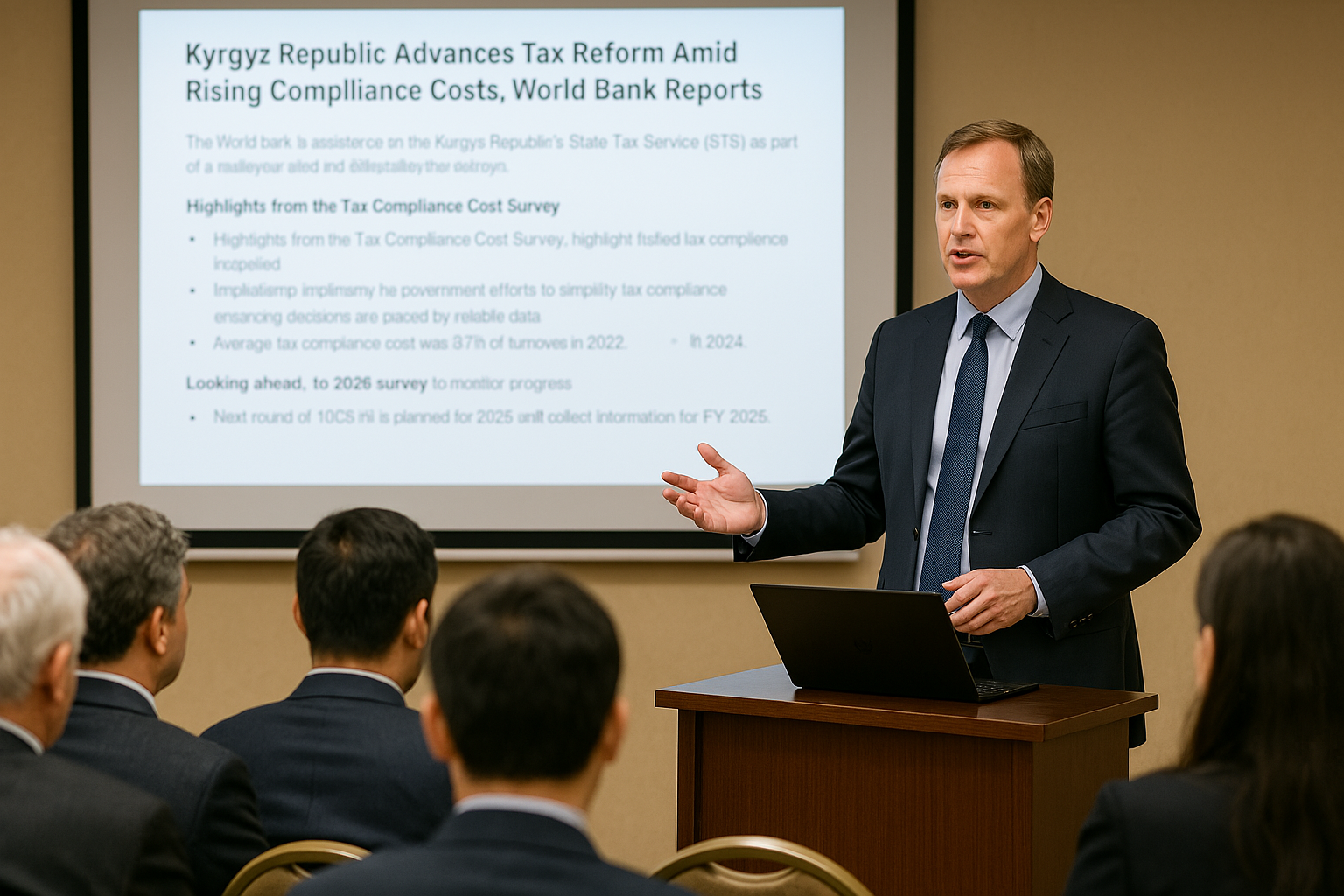Kyrgyz Republic Advances Tax Reform Amid Rising Compliance Costs, World Bank Reports
Kyrgyz Republic Moves Forward with Tax System Modernization Amid Challenges for Small Businesses.

The World Bank is extending technical assistance to the Kyrgyz Republic’s State Tax Service (STS) as part of a multi-year initiative to modernize and fully digitalize the country’s tax system. The initiative is supported through a grant from the Swiss State Secretariat for Economic Affairs (SECO) and administered via the World Bank’s Global Tax Program (GTP). This effort aims to enhance tax policy implementation, reduce compliance burdens, and improve transparency and efficiency in public revenue collection.
Building on Previous Reforms
This ongoing support continues earlier work conducted under the guidance of the International Finance Corporation (IFC), which laid the foundation for evidence-based policymaking in Kyrgyzstan’s tax sector. The World Bank’s latest engagement includes the commissioning of the two most recent rounds of the Tax Compliance Cost Survey (TCCS), a key diagnostic tool used to assess the administrative and financial burden of tax compliance on businesses across the country.
The latest survey results, presented in Bishkek on April 4, 2025, drew an audience of diverse stakeholders, including representatives from government institutions, business associations, policy think tanks, and international development partners. The presentation served as an important checkpoint on the progress made and the challenges that remain in the country’s tax reform journey.
Highlights from the Tax Compliance Cost Survey
The presentation underscored some promising developments. Notably, the STS has made measurable strides in digitalizing tax administration processes, streamlining the filing and payment of taxes through online platforms. These improvements are aligned with the government’s broader push to simplify regulatory procedures and foster a more business-friendly environment.
Moreover, the TCCS confirmed that the New Tax Code, which came into effect in recent years, has succeeded in incentivizing formalization of economic activity—encouraging many businesses to transition from the informal sector to the formal economy. This move is crucial for broadening the tax base and enhancing fiscal stability.
However, the survey also brought to light significant concerns. While formalization is a positive development, it has come with unintended consequences. For many newly formalized small and medium-sized enterprises (SMEs), the new regulations and requirements have imposed a steep learning curve and an increased compliance burden.
In particular, businesses with annual turnover up to KGS 8 million—a segment that comprises a large share of the Kyrgyz economy—reported that the average tax compliance cost reached 3.7% of turnover in 2023. This level is considered relatively high and could deter growth or incentivize informal activity unless mitigated through further policy and administrative reforms.
Complexity and Change: A Double-Edged Sword
The TCCS results suggest that while modernization and reform are essential, their pace and delivery method matter. Rapid changes in tax regulations, coupled with the swift rollout of new digital systems, have created adjustment pressures for both businesses and tax administrators.
The regulatory environment remains fluid, with frequent changes creating confusion and increasing the time and resources required for businesses to remain compliant. These dynamics highlight the importance of phased implementation, better communication strategies, and ongoing taxpayer education—particularly for SMEs that may lack the internal capacity to quickly adapt to new requirements.
Path Forward: Sustained Simplification and Strategic Reforms
According to the World Bank team, sustaining the momentum in tax reform will require a shift from reform quantity to reform quality—with a greater focus on implementation, simplification, and the practical realities faced by taxpayers. For small businesses especially, efforts should concentrate on:
-
Simplifying reporting and filing procedures
-
Reducing the number of tax payments
-
Enhancing user-friendliness of digital platforms
-
Offering more targeted taxpayer support services
The findings of the TCCS provide a data-rich foundation for the STS and policymakers to design responsive, evidence-based reforms that can ease the compliance burden and promote a more inclusive tax system.
Looking Ahead: 2026 Survey to Monitor Progress
The next round of the Tax Compliance Cost Survey is scheduled for 2026 and will collect data for fiscal year 2025. This will provide an opportunity to assess the impact of current reform efforts and identify any emerging challenges. Continued monitoring and evaluation will be vital for ensuring that the digital transformation of the Kyrgyz tax system remains equitable, efficient, and business-friendly.
The World Bank and its partners remain committed to supporting the Kyrgyz Republic in its pursuit of a modern, transparent, and inclusive tax system—one that enables sustainable growth and supports national development goals.










